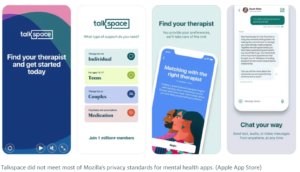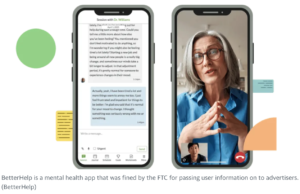The proliferation of mental health apps has been a silver lining, offering accessible support for users navigating mental well-being. However, beneath this veneer of convenience lies a pressing issue – the compromise of user data privacy. This article delves into the intricate world of mental health app data privacy, shedding light on recent incidents and the legal loopholes that allow such breaches to occur.
Mental health app data privacy problems
The Lucrative Nature of Mental Health Data
“Data is incredibly lucrative in the digital space,” warns Darrell West, a senior fellow at the Brookings Institution. Many companies derive substantial revenue from advertising, prompting concerns that user data related to mental health conditions might be exploited for targeted advertising.
Legal Battles: BetterHelp’s $7.8 Million Fine
In 2023, the Federal Trade Commission (FTC) ordered BetterHelp, a mental health platform owned by Teladoc, to pay a hefty $7.8 million fine for sharing users’ mental health data with Facebook and Snapchat for advertising purposes. This incident underscored the vulnerability of sensitive mental health information in the digital realm.
Cerebral’s Data Exposure Scandal
Telehealth startup Cerebral admitted to exposing sensitive patient information to tech giants like Google, Meta, TikTok, and third-party advertisers. Patient names, birth dates, insurance details, and responses to mental health self-evaluations were compromised, raising questions about the security practices of mental health apps.
Talkspace’s Explicit Data Usage Policy
Talkspace, a prominent mental health app, explicitly states in its privacy policy that it can use users’ inferences made during the sign-up questionnaire for marketing purposes, including tailored ads. This highlights a concerning trend where user data is harnessed without adequate consent for advertising endeavors.
Mozilla’s Privacy Standards: A Bleak Picture
Mozilla Foundation’s Privacy Not Included guide revealed that, out of 27 mental health apps assessed, only two met privacy and security standards in 2023. PTSD Coach, a self-help app by the US Department of Veteran Affairs, and Wysa, an AI chatbot app with live therapist sessions, were the exceptions. The majority of apps fell short in controlling user data, securing private information, and utilizing artificial intelligence.
Telehealth Boom and Data Exposure
The global telehealth market, valued at $101.2 billion in 2023, is projected to grow by 24.3% annually from 2024 to 2030. With mental health apps expected to grow substantially, opportunities for personal data exposure are on the rise. A December 2022 study found that 44% of 578 mental health apps shared user data with third parties.
Legal Framework: HIPAA and its Limitations
HIPAA, enacted in 1996, serves as America’s primary healthcare privacy law. However, not all entities, including many mental health apps, are bound by its regulations. The law covers communications between a healthcare provider and a patient, leaving a significant gap in the protection of user data shared through mental health apps.
Legal Loopholes: HITECH Act and ‘Napster Argument’
The HITECH Act of 2009 extended HIPAA guidelines to business associates of covered entities. However, private equity firms engaging in M&A deals in the healthcare sector, not considered business associates, exploit this loophole. The “Napster argument” involves creating narratives that circumvent regulations until legal challenges arise.
The Need for National Privacy Regulations
The absence of a national privacy law in the US exacerbates the challenges in governing data privacy for mental health apps. The lack of regulations has led to a wide spectrum of privacy practices among companies. Advocates emphasize the importance of users scrutinizing the privacy practices of mental health apps to ensure their individual preferences and protections align.
While mental health apps offer commendable support and accessibility, the data privacy challenges they pose cannot be overlooked. The legal loopholes, combined with the absence of robust regulations, create an environment where user data is susceptible to exploitation. As the telehealth industry continues to burgeon, the imperative for national privacy regulations becomes more apparent, ensuring the protection of sensitive mental health information in the digital age. Users are urged to remain vigilant and choose apps with transparent and stringent privacy practices.
Videos:
General Data Privacy and Mental Health:
- Electronic Privacy Information Center (EPIC): https://epic.org/ – EPIC advocates for privacy through research, litigation, and public education. Their website includes resources on mental health data privacy, HIPAA, and data breaches.
- The Center for Democracy and Technology (CDT): https://cdt.org/ – CDT promotes democratic values and individual freedoms online. Their website features resources on health data privacy and digital rights.
- The American Psychological Association (APA): https://www.apa.org/ – The APA provides ethical guidelines for psychologists, including those working in digital therapy. Their website offers information on digital health data privacy and ethical concerns.
News and Investigations:
- “The Mental Health App Data Privacy Problem Is Getting Worse” (Yahoo Finance): https://finance.yahoo.com/news/mental-health-apps-still-have-a-major-data-privacy-problem-161425354.html – This article highlights the latest research on data sharing practices by mental health apps.
- “Health Apps and Your Privacy: What You Need to Know” (The New York Times): https://www.nytimes.com/2019/09/03/technology/smartphone-medical-records.html – This article explores the legal and ethical considerations surrounding data collection and sharing by health and wellness apps.
- “Mental Health Apps Leave Vulnerable Users Exposed to Data Breaches” (Consumer Reports): https://www.consumerreports.org/health/health-privacy/mental-health-apps-and-user-privacy-a7415198244/ – This article highlights the risks of data breaches and security vulnerabilities in mental health apps.
Apps and Tools:
- PrivacyGrade: https://hcii.cmu.edu/project/privacygrade – PrivacyGrade reviews popular apps and assigns them a privacy score based on their data collection and sharing practices.
- DuckDuckGo: https://duckduckgo.com/ – DuckDuckGo is a private search engine that does not track or store your search history.
- Signal: https://signal.org/ – Signal is a secure messaging app that uses end-to-end encryption to protect your messages.
Advocacy and Action:
- Fight for the Future: https://www.fightforthefuture.org/ – Fight for the Future advocates for strong online privacy protections and digital rights. Their website provides resources for contacting legislators and taking action on data privacy issues.
- Electronic Frontier Foundation (EFF): https://www.eff.org/ – The EFF defends digital rights and fights for online privacy. Their website provides resources for learning about data privacy issues and taking action.
- MentalHealth.gov: https://www.samhsa.gov/mental-health – MentalHealth.gov is a U.S. government website that provides information and resources on mental health, including resources for finding mental health professionals.


